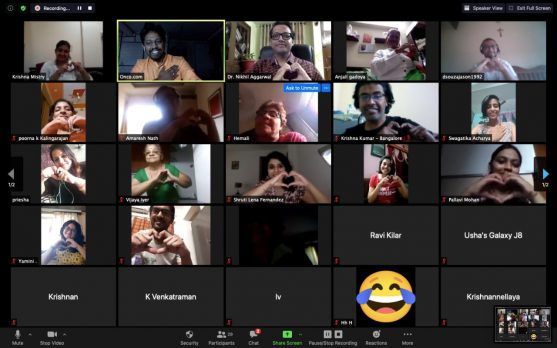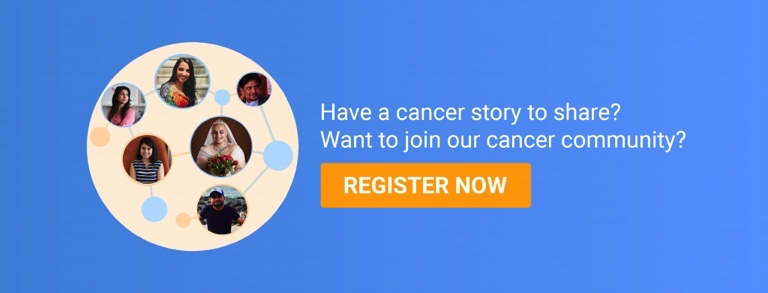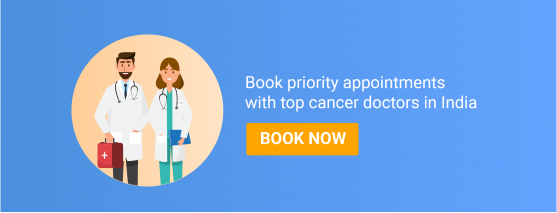“Cancer is a very taxing disease. It takes up your mental health as well as your physical health. So I think it’s important to surround yourself with like-minded people, or people who have gone through the same disease as you; people who are positive and who have come out of it, because that will help you in your recovery.”
That’s what Jason D’souza, two-time cancer survivor, said at the latest Talk Your Heart Out (TYHO) session.
Watch this video of the last TYHO session, conducted on 15 August, to celebrate freedom from cancer.
To be able to openly talk about cancer is not as easy as it sounds. A lot of survivors share that they find it difficult to talk about their cancer because others look upon it as a plea for attention. In some households, talking about cancer is considered inauspicious and negative.
For all of these reasons, cancer patients find themselves bottling up their feelings about their illness. Over time, this leads to resentment and they tend to act out at the slightest provocation. Several cancer patients who have attended our support group have confessed that they acted out, often shouting at near and dear ones for no reason, during their cancer treatment.
While their own family members are sometimes puzzled over why they have become more irritable and angry, even when all efforts are being taken to keep them comfortable, other survivors know that this is a normal reaction to cancer treatment that even they have gone through.
This is why a support group can go a long way in helping a cancer patient recover. It allows you to meet others who have had the same experiences. You find a safe place to vent your feelings without being judged for it and can also gain from the experience of others.
In Jason’s words, other cancer survivors ‘get it’ when you complain. They don’t doubt your feelings. They too have gone through those same feelings.
What is a support group?
Support groups are meetings for people with something in common. Cancer support groups, therefore, bring together people who have experienced cancer in some way; including current patients, survivors, caregivers etc.
The purpose of a support group is usually to provide an opportunity to the participants to share their feelings, the ups and downs of their treatment journey, so that they can find encouragement and empathy from the others present at the meeting.
Some groups might also focus on helping the participants with useful resources like nutritional advice, information on hospitals and diagnostic centres, tips for improving mental health etc.
Groups might meet on a weekly, fortnightly or monthly basis, and might keep in touch during the interim period via social media or email. The organiser or facilitator of the group might oversee communication among group members, if the need be.

Talk Your Heart Out’s online session
How do I find the right group for me?
Here are a few basic questions that will help you find out if a particular group works for you or not:
-
Who attends the meetings?
If you prefer a group that includes people from your own country, region or age group, you can select accordingly. Most people prefer a group with a mix of different types of participants as it allows for more perspectives and ideas.
-
Do I like large groups or small groups?
While large groups provide you with a lot of resources, contacts and ideas, smaller groups might seem more personal and attentive.
-
How often does the group meet?
Depending on how much time you can allot to this, you might want to select one that meets often enough to provide sufficient support and interaction.
-
Are there any experts in the group?
You might want to ensure that no false cures, or incorrect medical information is being circulated in the group by selecting a group that is managed by a professional (like a qualified counsellor or oncologist, or a competent and ethical individual).
Do I have to talk?
A good support group will not force you to share your feelings. You will be allowed to just listen to the others till you feel ready to share.
Even if you don’t want to share your feelings in the group, there are plenty of ways you will still benefit from a support group.
- Just listening to others talking about their cancer journeys can be validating and cathartic. It helps you deal with your own emotions without saying anything.
- You can benefit from the experience of others, with tips on what you can do and what you should avoid in your recovery process.
- You can make friends who are more likely to understand you.
- You can enjoy group events like seminars on topics that might interest you.
- Social interaction gives you something to look forward to and can help reduce anxiety and isolation.
During the pandemic, most support groups have moved their activities online. They conduct their session virtually. You will also find them on social media and on whatsapp.
Onco.com’s support group Talk Your Heart Out meets online twice a month. At each session, a different cancer fighter, survivor or caregiver shares their journey with the group. The attendees use this opportunity to share questions, tips or encouragement with each other.
If you would like to know more about our cancer support group, email us at community@onco.com. There are no charges involved and you can attend the sessions based on your comfort, without any compulsions.



